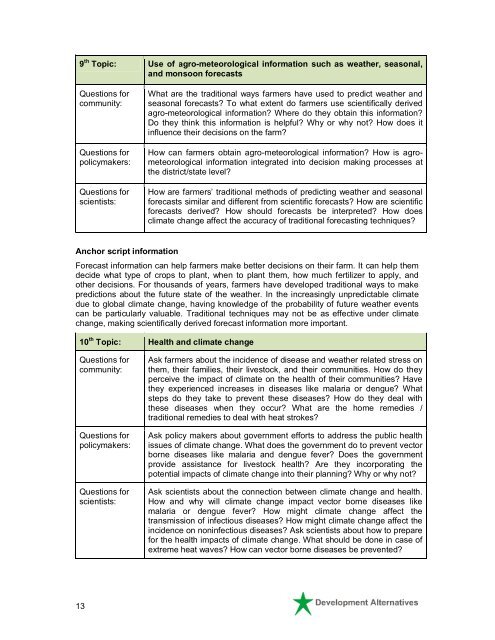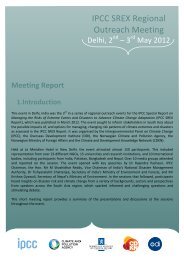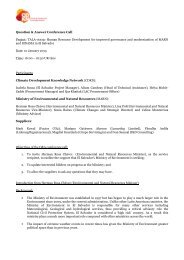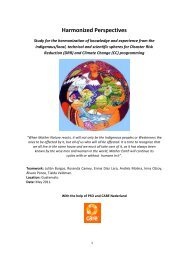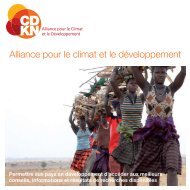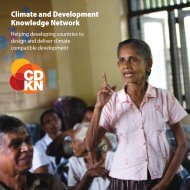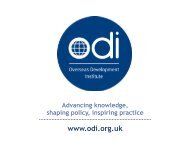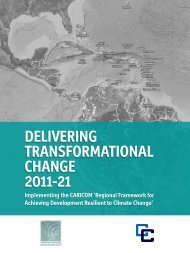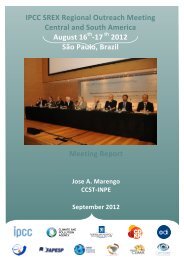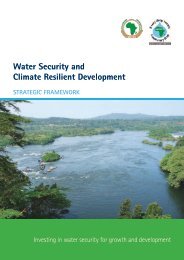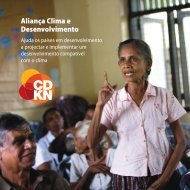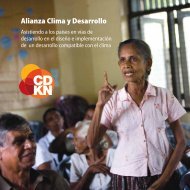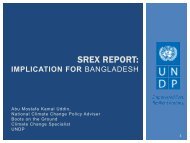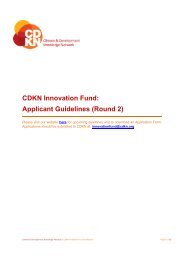Climate Change Guide for Community Radio ... - CDKN Global
Climate Change Guide for Community Radio ... - CDKN Global
Climate Change Guide for Community Radio ... - CDKN Global
Create successful ePaper yourself
Turn your PDF publications into a flip-book with our unique Google optimized e-Paper software.
9 th Topic: Use of agro-meteorological in<strong>for</strong>mation such as weather, seasonal,and monsoon <strong>for</strong>ecastsQuestions <strong>for</strong>community:Questions <strong>for</strong>policymakers:Questions <strong>for</strong>scientists:What are the traditional ways farmers have used to predict weather andseasonal <strong>for</strong>ecasts? To what extent do farmers use scientifically derivedagro-meteorological in<strong>for</strong>mation? Where do they obtain this in<strong>for</strong>mation?Do they think this in<strong>for</strong>mation is helpful? Why or why not? How does itinfluence their decisions on the farm?How can farmers obtain agro-meteorological in<strong>for</strong>mation? How is agrometeorologicalin<strong>for</strong>mation integrated into decision making processes atthe district/state level?How are farmers’ traditional methods of predicting weather and seasonal<strong>for</strong>ecasts similar and different from scientific <strong>for</strong>ecasts? How are scientific<strong>for</strong>ecasts derived? How should <strong>for</strong>ecasts be interpreted? How doesclimate change affect the accuracy of traditional <strong>for</strong>ecasting techniques?Anchor script in<strong>for</strong>mationForecast in<strong>for</strong>mation can help farmers make better decisions on their farm. It can help themdecide what type of crops to plant, when to plant them, how much fertilizer to apply, andother decisions. For thousands of years, farmers have developed traditional ways to makepredictions about the future state of the weather. In the increasingly unpredictable climatedue to global climate change, having knowledge of the probability of future weather eventscan be particularly valuable. Traditional techniques may not be as effective under climatechange, making scientifically derived <strong>for</strong>ecast in<strong>for</strong>mation more important.10 th Topic: Health and climate changeQuestions <strong>for</strong>community:Questions <strong>for</strong>policymakers:Questions <strong>for</strong>scientists:Ask farmers about the incidence of disease and weather related stress onthem, their families, their livestock, and their communities. How do theyperceive the impact of climate on the health of their communities? Havethey experienced increases in diseases like malaria or dengue? Whatsteps do they take to prevent these diseases? How do they deal withthese diseases when they occur? What are the home remedies /traditional remedies to deal with heat strokes?Ask policy makers about government ef<strong>for</strong>ts to address the public healthissues of climate change. What does the government do to prevent vectorborne diseases like malaria and dengue fever? Does the governmentprovide assistance <strong>for</strong> livestock health? Are they incorporating thepotential impacts of climate change into their planning? Why or why not?Ask scientists about the connection between climate change and health.How and why will climate change impact vector borne diseases likemalaria or dengue fever? How might climate change affect thetransmission of infectious diseases? How might climate change affect theincidence on noninfectious diseases? Ask scientists about how to prepare<strong>for</strong> the health impacts of climate change. What should be done in case ofextreme heat waves? How can vector borne diseases be prevented?13


